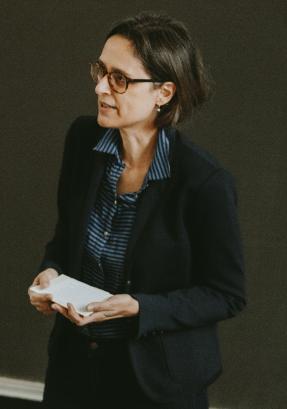
Nassim W. Balestrini is Full Professor of American Studies and Intermediality at the University of Graz, Austria, where she also heads the Centre for Intermediality Studies in Graz (CIMIG) (https://intermediality-centre.uni-graz.at/en/centre/). Before 2014, she taught at the universities of Mainz, Paderborn, and Regensburg (in Germany) and at the University of California, Davis (USA). Within the fields of US-American and Canadian literature, she is interested in intermediality and adaptation theory, life writing across media, hip hop (particularly rap as poetry and contemporary Indigenous and Alaskan artists), African American literature, and new approaches to the historiography of theater and poetry. Contemplating borders and mobility—be it between nations, cultures, languages, or media—informs much of her research. Since the mid-2010s, climate change theater has played a major role in her research and teaching. In this context, she has been exploring ways of collaborating with artists in order to integrate creative work into literary and cultural studies classroom.
For her postdoctoral thesis, From Fiction to Libretto (Peter Lang, 2005), she explored the adaptation of three classic narrative texts into opera and spoken drama. As Washington Irving’s “Rip Van Winkle,” Nathaniel Hawthorne’s The Scarlet Letter, and Henry James’s Washington Square have been adapted numerous times by librettists, composers, and dramatists in and outside the United States, the project focused on a cultural history of this phenomenon. She thus reflected on the histories and historiographies of musical theater, drama, and fiction in ways that acknowledged the impact of canonized works and the abundance of (to a large extent not well-known) adaptations. At a time in which adaptation studies primarily focused on novel-to-film case studies, her research illustrated not only the ubiquity of adaptation but also its breadth of formal variation and argumentative flexibility.
More recently, her intermediality-focused research has been dealing with twentieth-century and twenty-first-century poets, with life writing, and with climate change theater. For instance, she has explored verbal–visual and literary–musical strategies in the lyrical and prose works of Robert Hayden, Natasha Trethewey, Sherman Alexie, and Layli Long Soldier. Her analyses of the strategic use(s) of intermedial stylistic strategies in life writing by hip-hop artists, in rap poetry, in hip-hop videos, and in Lin-Manuel Miranda’s musicals In the Heights and Hamilton are, among other things, oriented towards showing that intermediality theory can be a crucial heuristic tool for uncovering the inner workings of frequently underestimated genres. In the context of ecodrama and especially of theater focused on climate change, she has addressed the affordances of microdramas and full-length plays in relation to the argumentative use of dramatic forms and to their potential to serve as vehicles for activism. The analysis of intermedial features has also worked well in conjunction with the discussion of culturally embedded forms of expression. Here, she finds it particularly decisive to consider how non-Western artistic forms and non-Western systems of knowledge as well as of preserving and passing on such knowledge participate in or are foregrounded in specific works. While much of her research on climate change theater has been dealing with Chantal Bilodeau’s evolving series of eight full-length dramas (see the “Arctic Cycle” subsection on https://artsandclimate.org/upcoming) and with micro-dramas written for Climate Change Theatre Action (http://www.climatechangetheatreaction.com/about/), she has also been compiling a large number of other climate change plays.
During her time at CLIC, Nassim Balestrini will delve further into climate change theater in order to fathom how playwrights and directors use intermedial features. Areas of inquiry will comprise
(1) the potential of intermediality in fostering a spirit of hope that encourages activism and personal engagement with climate change;
(2) the use of specific media in order to highlight individuals and/or to create a sense of a theatrical commons; and
(3) the potentially innovative role of soundscapes, music, silence, and other sonic features.
Selected publications related to the project:
Balestrini, Nassim W. “The San Francisco Opera House as a Music Theater Commons: Performing Heart of a Soldier Ten Years After 9/11.” American Cultures as Transnational Performance, edited by Katrin Horn, Leopold Lippert, Ilka Saal, and Pia Wiegmink. Routledge, 2021: pp. 23-37. DOI: 10.4324/9781003048947-2.
---. “Of Silent Notation and Historiographic Relationality: Words, Music, and Notions of the Popular.” The Popularity of Words and Music, edited by Thomas Gurke and Susan Winnett. Palgrave, 2022: pp. 11-35. DOI: 10.1007/978-3-030-85543-7_2.
---. “Anthropogenic Climate Change Condensed: Creating Community in Very Short Plays.” Region, Environment, and Community in American Literary Short Forms, guest-edited by Ina Bergmann, Journal of the Short Story in English/Les Cahiers de la Nouvelle, vol. 73 (autumn 2019), [published in 2021]: pp. 121–134.
---. “Sounding the Arctic in Chantal Bilodeau’s Climate Change Plays.” Nordic Theatre Studies, vol. 32, no. 1, 2020, pp. 66–81. DOI: 10.7146/nts.v32i1.120408.
---.“Climate Change Drama across Time and Space: Chantal Bilodeau’s Forward (2016).” Green Matters, edited by Maria Löschnigg and Melanie Braunecker, Brill, 2019, pp. 295–307. DOI: 10.1163/9789004408876_017.
---.“Transnational and Postcolonial Perspectives on Communicating Climate Change through Theater.” Addressing the Challenges in Communicating Climate Change Across Various Audiences, edited by Walter Leal Filho et al., Springer, 2019, pp. 247–61. DOI: 10.1007/978-3-319-98294-6_16.
---. “Cli-Fi Drama and Performance.” Contribution to an extended forum section on “cli-fi,” edited by Susanne Leykam and Julia Leyda. Amerikastudien/American Studies, vol. 62, no. 1, 2017, pp. 114–20. JSTOR. https://www.jstor.org/stable/44982309. ISSN: 0340-2827.
---. “Climate Change Theater and Cultural Mobility in the Arctic: Chantal Bilodeau’s Sila (2014).” Special issue on “Theater and Mobility,” Journal of Contemporary Drama in English, vol. 5, no. 1, 2017, pp. 70–85. DOI: doi.org/10.1515/jcde-2017-0006.
---, Katharina Fackler, and Klaus Rieser. “Introduction.” Soundscapes, Sonic Cultures, and American Studies, special issue of JAAAS: The Journal of the Austrian Association for American Studies, co-edited with Katharina Fackler and Klaus Rieser, vol. 1, no. 2 (2020) [published in 2021]: pp. xix–xxvi. DOI: 10.47060/jaaas.v1i2.115.
